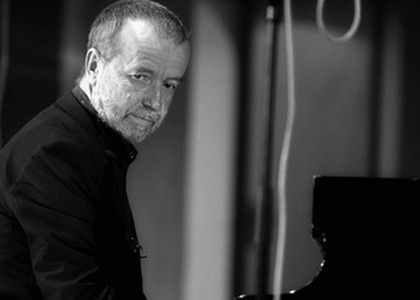> [Archived] Interviews

Interview with Mircea Tiberian
Pianist Mircea Tiberian performs a concert dedicated to the composer Constantin Silvestri, in Bucharest, today, starting at 19:00, at ARCUB - Hanul Gabroveni.
The event is part of the cycle "Constantin Silvestri Days, 110 years of birth". How Mircea Tiberian thought of this concert and with which musicians he will collaborate, you will learn from the interview he gave to Viorel Grecu.
So prepare for a very special concert, a jazz concert dedicated to Constantin Silvestri. What exactly will the repertoire consist of? Will there be reworkings of his compositions or will there be a different approach?
There will be no reworking of his compositions. The concert is part of a series of several performances dedicated to the 110th anniversary of Constantin Silvestri's birth, and because Silvestri was also quite a good improviser, the organisers thought of including a jazz or improvised music concert.
And so we went with a chamber formula closer to the atmosphere of the pieces, especially as I am quite familiar with interwar classical music, I have made a few records in this way.
We suggest more the atmosphere and spirit of the Romanian classical style through certain themes - mostly my own compositions - and through the improvisations of musicians who are open to classical music.
This is Claudio Puntin on clarinet. He is a clarinettist who is highly regarded in Europe, who plays symphonic concerts, and improviser, and creator, and composer. He lives in Germany.
With him and double bassist Chris Dahlgren, with whom I've been collaborating for 20 years (I wanted to bring him along with a viola da gamba, he improvises in the baroque style), and on vocals Nadia Trohin, who is also open to classical music.
Some listeners know that we have two records, one is dedicated to Romanian folklore, the other to light music from the period in question, i.e. the period when Constantin Silvestri was active in Romania. Now we thought of having another approach to the 30s and 50s, which is from chamber music to improvised music.
There are two records that Nadia Trohin, if I'm not mistaken, and Chris Dahlgren participated in. Do you intend to make a trilogy, here and now with classical music, inspired by Constantin Silvestri and maybe other Romanian composers?
Yes. It would be a project that could materialize into an album, but I don't think we will necessarily record it in the first concert. From a strategic point of view it's not the best idea.
But we have the opportunity to play again in the same formula, in September at the Bucharest Jazz festival, made by ARCUB, also in ARCUB, so I will use the same piano and this is a kind of preview.
Are they familiar with the music of Constantin Silvestri and Chris Dahlgren and Claudio Puntin?
Yes. Claudio Puntin is an interesting character in terms of his relationship with Romania. He is around 60 years old. When he was a teenager he followed Celibidache everywhere. He went to most of Celibidache's workshops in Italy, France, without practicing conducting, but he said he had a lot to learn from an interpretative point of view. And he also took some courses in Balkan music.
They all have contacts with the Romanian space. And Chris Dahlgren played a lot with Maria Răducanu, Maria Răducanu's repertoire of old songs.
He almost became Romanianised, because he has been working with Romanian artists for a long time.
He has a double bass left here in Bucharest, but since he left the double bass he hasn't had a concert, it didn't bode well, but now it's the first time he's going to use it.
My intention is to have him play the viola da gamba, which is an absolutely wonderful instrument, but we couldn't transport a viola, the budget here is limited, but at a bigger festival you can afford to put it on a plane, in a very sturdy box. It's a small thing, but in the end it makes a difference in the production of a concert.
Translated by Andreea Petrescu,
University of Bucharest, Faculty of Foreign Languages and Literatures, MTTLC, year I
Corrected by Silvia Petrescu














